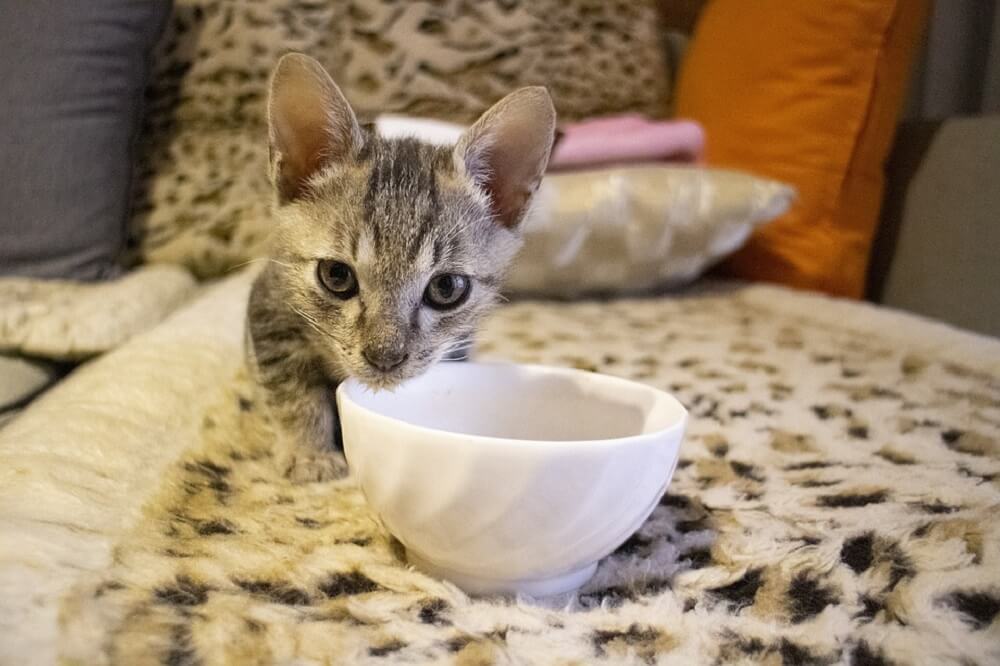If you have a kitten that seems to be experiencing frequent gas, it can be both a concerning and unpleasant experience. Gassiness in kittens can often be attributed to their diet, and finding the best cat food that helps reduce gas can make a significant difference. In this comprehensive review, we will explore the best cat food for gassy kittens available on Amazon.com, based on sales and customer reviews. We will also address common questions pet owners have about managing gas in kittens through diet.
Best Cat Food for Gassy Kittens: Top 5
Selecting the best cat food for a gassy kitten is crucial for their comfort and health. The products reviewed above offer a range of benefits tailored to the unique needs of growing kittens with sensitive stomachs. Whether you prefer limited ingredient diets, grain-free options, or formulas rich in DHA for cognitive development, there is a suitable choice for every preference and budget.
Quick REVIEW - Pros/Cons for our selections:
Pros:
- Blue Buffalo Basics: Simplified ingredients, grain-free, high-quality protein.
- Hill’s Science Diet: High-quality protein, DHA for brain development, balanced nutrition.
- Royal Canin: Tailored nutrition, supports immune health, highly digestible.
- Purina Pro Plan: High-quality protein, DHA, gentle on stomach.
- Wellness CORE: Grain-free, high-quality protein, DHA for cognitive health.
Cons:
- Blue Buffalo Basics: Higher price, adjustment period.
- Hill’s Science Diet: Contains grains, transition needed.
- Royal Canin: Higher cost, adjustment period.
- Purina Pro Plan: Contains fillers, not grain-free.
- Wellness CORE: Premium price, taste adjustment.
By choosing the right diet, you can help your gassy kitten feel better and thrive. Ensuring balanced, easily digestible nutrition is key to reducing gas and supporting overall health.
1. Top-rated gentle cat food formula for digestive comfort
Blue Buffalo Sensitive Stomach
[amazon box=”B0084FNW3K”/]
Blue Buffalo Sensitive Stomach is designed for kittens with food sensitivities. It features a simple ingredient list, which helps in reducing digestive issues like gas.
Key Features:
- Limited Ingredients: Helps identify and avoid potential allergens.
- Grain-Free: Reduces risk of digestive discomfort.
- High-Quality Protein: Deboned turkey is the primary protein source.
Pros:
- Simplified ingredients reduce digestive upset, gas, flatulence.
- Grain-free formula.
- High-quality, easily digestible protein source.
Cons:
- Higher price point.
- Some kittens might need time to adjust to the taste.
Customer Reviews: Many pet owners have reported a noticeable reduction in their kittens’ gassiness after switching to this food. The limited ingredient list is particularly praised for being gentle on sensitive stomachs.
2. Natural and easy-to-digest cat food for gassy kittens
Hill’s Science Diet Kitten Healthy Development Chicken Recipe
[amazon box=”B0040B9VXM”/]
Hill’s Science Diet is a trusted name in pet nutrition, and their Healthy Development Chicken Recipe is formulated to support kittens’ growth while being gentle on their digestive systems.
Key Features:
- High-Quality Ingredients: Includes chicken as the first ingredient.
- DHA from Fish Oil: Supports brain and eye development.
- Balanced Nutrition: Ensures overall health and growth.
Pros:
- High-quality protein supports healthy growth.
- DHA promotes brain and eye development.
- Well-balanced, easily digestible formula.
Cons:
- Contains grains which might not suit all kittens.
- Some kittens may require a transition period.
Customer Reviews: Owners have noted improvements in their kittens’ overall health and reduction in gas issues. The high-quality protein and balanced nutrition are frequently highlighted in positive reviews.
3. Nutritional cat food that help soothe kitten’s digestive system
Royal Canin Feline Care Digestive Care
[amazon box=”B00CGRLSW4″/]
Royal Canin Feline Care Digestive Care is known for its breed and size-specific formulas. Their Feline Health Nutrition Kitten Food provides balanced nutrition tailored for kittens.
Key Features:
- Tailored Kibble Size: Easier for kittens to chew and digest.
- Antioxidants and Vitamins: Supports immune health.
- Highly Digestible Proteins: Reduces digestive issues.
Pros:
- Specifically designed for kittens’ nutritional needs.
- Supports immune system with antioxidants.
- Highly digestible ingredients.
Cons:
- Higher cost compared to some other brands.
- Some kittens may need an adjustment period.
Customer Reviews: This product is praised for its positive impact on kittens’ digestive health and overall development. The tailored nutrition has helped many owners reduce Flatulence in their kittens.
4. Best kitten food for reducing flatulence and improving digestion
Purina Pro Plan Focus Kitten Chicken & Rice Formula
[amazon box=”B003R0LLIK”/]
Purina Pro Plan Kitten formula offers a balanced diet with a focus on high-quality ingredients to support growing kittens’ needs and reduce digestive issues.
Key Features:
- Real Chicken: First ingredient for high-quality protein.
- DHA: Supports brain and vision development.
- Easily Digestible Ingredients: Reduces gas and digestive upset.
Pros:
- High-quality protein source.
- DHA for cognitive and vision development.
- Formulated to be gentle on the stomach.
Cons:
- Contains some fillers.
- Not grain-free, which may not be suitable for all kittens.
Customer Reviews: Pet owners have reported a decrease in gas and improved overall health. The high-quality protein and DHA are frequently mentioned benefits.
5. Best cat food for gassy kittens with sensitive stomachs
Wellness CORE Grain-Free Kitten Formula
[amazon box=”B06X9PD36H”/]
Wellness CORE Grain-Free Kitten Formula provides a high-protein, grain-free option that supports healthy growth and reduces digestive issues.
Key Features:
- Grain-Free: Helps minimize digestive problems.
- High-Quality Protein: Supports muscle development.
- Added DHA: Promotes brain and eye development.
Pros:
- Grain-free formula reduces digestive upset.
- High-quality protein for muscle growth.
- Promotes cognitive and eye health with DHA.
Cons:
- Premium price.
- Some kittens may need time to adapt to the new diet.
Customer Reviews: Owners have noted significant improvements in their kittens’ digestive health and a reduction in gassiness. The grain-free formula is particularly appreciated for being gentle on sensitive stomachs.
Common Questions About Food for Gassy Kittens
1. What causes gassiness in kittens?
Gassiness in kittens can be caused by a variety of factors, including food allergies, intolerance to certain ingredients, eating too quickly, or underlying health issues. Identifying the cause often requires a process of elimination and possibly consultation with a veterinarian.
2. How can I reduce flatulence in my kitten through diet?
Choosing a high-quality, easily digestible food with limited ingredients can help reduce gas. Grain-free options or foods formulated for sensitive stomachs are often beneficial. Gradually transitioning to a new food can also help.
3. Are grain-free diets better for gassy kittens?
Grain-free diets can be beneficial for kittens with grain sensitivities or allergies, which can cause digestive issues like gas. However, not all kittens require a grain-free diet, and it’s essential to choose a balanced formula.
4. How should I transition my kitten to a new food?
Transitioning to a new food should be done gradually over 7-10 days. Start by mixing a small amount of the new food with the current food and gradually increase the proportion of the new food while decreasing the current food.
5. What ingredients should I avoid for a gassy kitten?
Ingredients that commonly cause digestive issues include low-quality fillers, artificial preservatives, and certain grains. Opting for foods with high-quality proteins and limited ingredients can help minimize gas.
6. How often should I feed my gassy kitten?
Kittens typically need to be fed more frequently than adult cats. Offering smaller, more frequent meals can help reduce gas compared to feeding larger meals less frequently.
7. When should I consult a vet about my kitten’s gassiness?
If dietary changes do not improve Flatulence in your kitten, or if the gas is accompanied by other symptoms like diarrhea, vomiting, or lethargy, it’s essential to consult a veterinarian to rule out underlying health issues.

